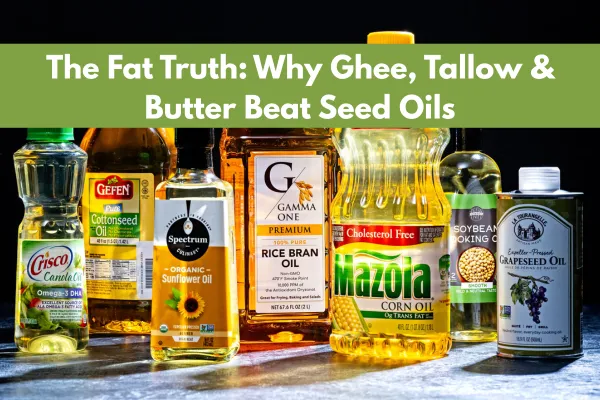
The Fat Truth: Why Ghee, Tallow & Butter Beat Seed Oils
The Fat Truth: Why Ghee, Tallow & Butter Beat Seed Oils
Why Fat Got a Bad Reputation
For most of human history, fat wasn’t feared—it was treasured. Ancient cultures prized butter, tallow, lard, and ghee as sacred foods. Yet in the mid-20th century, a scientific shift turned fat into the enemy.
In the 1950s, physiologist Ancel Keys proposed the “lipid hypothesis”—the idea that saturated fat and cholesterol cause heart disease. Despite weak evidence and cherry-picked data, his theory gained traction. By the 1970s, food corporations and policymakers embraced it, leading to the 1977 U.S. Dietary Guidelines, which urged Americans to replace saturated fat with “vegetable oils.”
The result?
Americans cut butter and animal fats, swapping them for margarine and seed oils.
Food companies reformulated products to be “low-fat” and loaded with refined carbs and sugar.
National obesity and chronic disease rates skyrocketed.
📊 National Statistics (CDC & NIH):
In 1960, 13% of U.S. adults were obese. By 2020, that number exceeded 42%.
Type 2 diabetes rose from less than 1% of adults in 1958 to over 11% today (~37 million Americans).
Heart disease remains the leading cause of death in the U.S., despite 40+ years of low-fat dietary guidance.
As Dr. Ken Berry says: “We didn’t get sicker because of butter—we got sicker because we replaced butter with seed oils and sugar.”
The Problem with Seed Oils
Seed oils (often mislabeled as “vegetable oils”) are now the most consumed fat in the American diet. Yet they are industrial byproducts that humans never evolved to eat.
Here’s why they’re harmful:
1. Highly Processed & Chemically Extracted
Soy, corn, cottonseed, sunflower, and canola oils are produced by heating seeds to extreme temperatures, extracting with solvents like hexane, and deodorizing rancid fats to hide their smell. This process destroys nutrients and creates toxic byproducts.
2. Unstable Omega-6 Fats
Seed oils are high in omega-6 polyunsaturated fats (PUFAs). Unlike stable saturated fats, PUFAs oxidize easily, creating aldehydes and free radicals that damage cells.
Study: A 2015 paper in Progress in Lipid Research linked high omega-6 intake to oxidative stress, inflammation, and chronic disease.
3. Promote Inflammation
Too much omega-6 (relative to omega-3) creates a pro-inflammatory environment in the body.
Ancestral diets had an omega-6:3 ratio near 1:1.
Today, thanks to seed oils, the ratio is closer to 20:1.
Chronic inflammation is a driver of obesity, diabetes, heart disease, autoimmune conditions, and neurodegeneration.
Study: Biomedicine & Pharmacotherapy (2018) found that excessive omega-6 increases inflammatory markers tied to cardiovascular disease and cancer.
4. Linked to Obesity & Metabolic Dysfunction
Seed oils interfere with mitochondrial function, making it harder for your body to burn fat efficiently.
Study: A 2020 review in Nutrients reported that linoleic acid (the main omega-6 in seed oils) promotes fat storage and insulin resistance.
Dr. Cate Shanahan (Deep Nutrition) calls seed oils the “Eight Hateful Oils” and warns that they are the single biggest contributor to modern chronic disease.
Why Ghee, Tallow, and Butter Win
Unlike fragile seed oils, ancestral fats are stable, nutrient-dense, and supportive of health.
🧈 Butter (Grass-Fed)
Rich in CLA (conjugated linoleic acid), which supports metabolism and immune health.
Contains fat-soluble vitamins A, D, E, K2—essential for hormone balance, bone strength, and skin repair.
Provides butyrate, a short-chain fatty acid that reduces inflammation and heals the gut.
🥥 Ghee (Clarified Butter)
Lactose-free and shelf-stable.
Used in Ayurvedic medicine for thousands of years for digestion, brain health, and vitality.
Packed with anti-inflammatory fatty acids that promote colon and liver health.
🥩 Tallow (Beef Fat)
Exceptionally stable for cooking at high heat.
High in stearic acid, shown to support healthy mitochondria and fat metabolism (Nature Metabolism, 2019).
Used ancestrally for both cooking and skincare.
As Dr. Shawn Baker says: “Animal fats aren’t the problem—they’re the solution. They gave us the brains and bodies we have today.”
The Brain Needs Fat
Your brain is nearly 60% fat. Cholesterol and saturated fats are the raw materials for neurons, synapses, and hormones. Replacing these with unstable seed oils is like patching a roof with paper.
Neuroscientist Andrew Huberman emphasizes that cholesterol is critical for neurotransmitter function and that low-fat diets impair brain health.
Omega-3s from fish plus stable animal fats create the optimal foundation for cognition, focus, and longevity.
Ancestral Guidelines for Healthy Fat
To reclaim your health, return to the fats humans thrived on for millennia:
Eliminate Seed Oils: Ditch soybean, canola, corn, sunflower, safflower, cottonseed. Read labels—they hide in everything.
Cook with Stable Fats: Use ghee, butter, tallow, or coconut oil.
Choose Grass-Fed & Pastured: Nutrient density is much higher than conventional.
Eat the Whole Animal: Don’t trim off fat or avoid skin—this is where nutrition is concentrated.
Balance with Whole Foods: Add fatty fish for omega-3s to balance fat intake.
Bottom Line: Fat Is Your Friend
The past 50 years of “low-fat” dietary advice pushed Americans away from butter and beef fat into the arms of Big Food and Big Seed Oil. The results? An explosion in obesity, diabetes, heart disease, and chronic inflammation.
Seed oils are a failed experiment. Traditional fats—ghee, butter, tallow—are ancestral superfoods. They don’t just give you energy; they support your hormones, gut health, brain, and long-term vitality.
As Dr. Paul Saladino says: “The closer we eat to what our ancestors ate, the more our biology remembers how to thrive.”
References & Resources
Experts & Clinicians:
Dr. Ken Berry – YouTube | Website
Dr. Paul Saladino – YouTube | Website
Dr. Cate Shanahan – Website
Dave Asprey – Website
Scientific Studies:
DiNicolantonio, J., et al. (2015). Progress in Lipid Research: Omega-6 intake, oxidative stress, and chronic disease. Link
Innes, J. & Calder, P. (2018). Biomedicine & Pharmacotherapy: Omega-6 fatty acids and inflammation. Link
Klil-Drori, A., et al. (2020). Nutrients: Linoleic acid and metabolic dysfunction. Link
Cardoso, A. et al. (2019). Nature Metabolism: Stearic acid and mitochondrial function. Link
